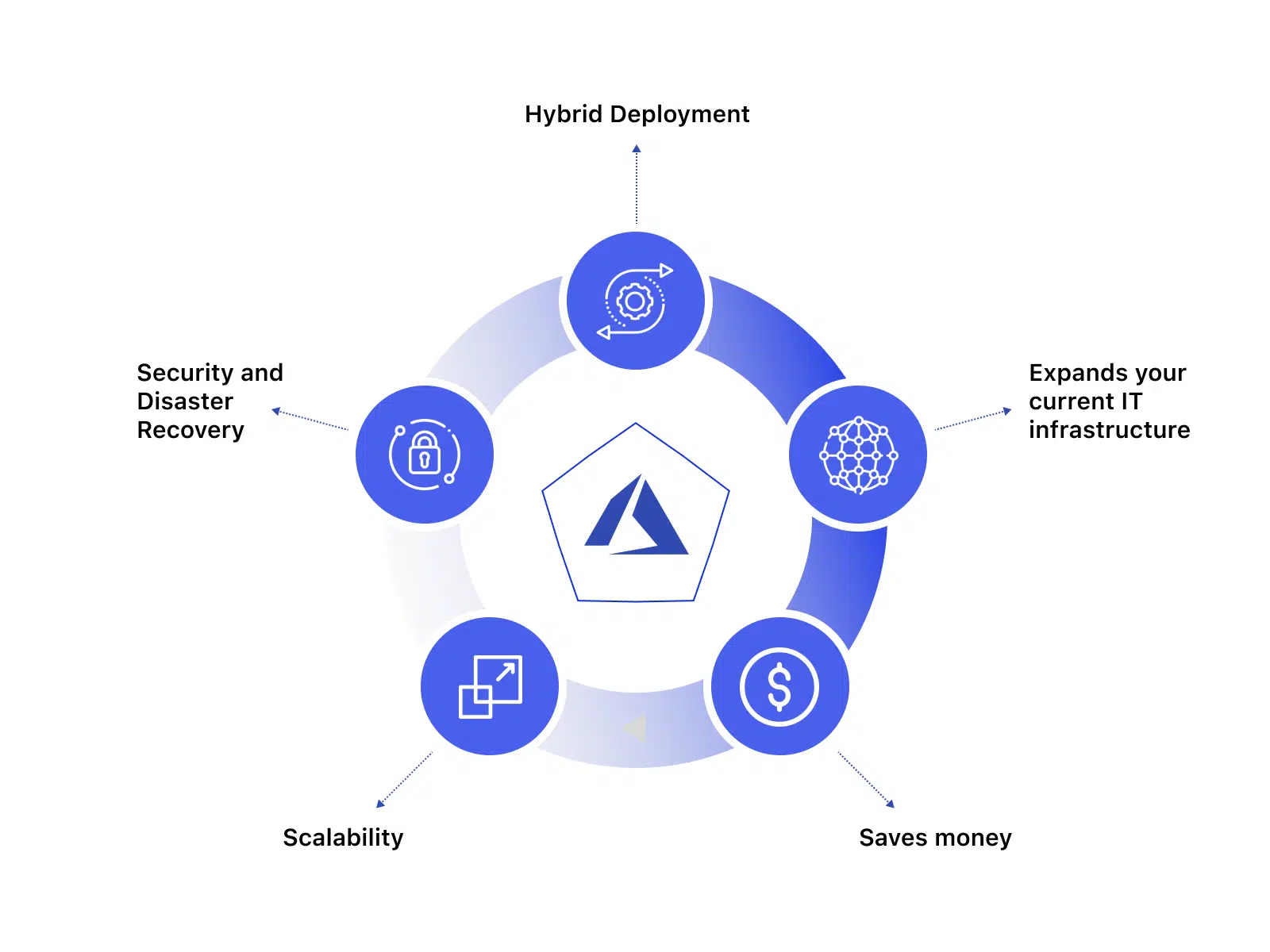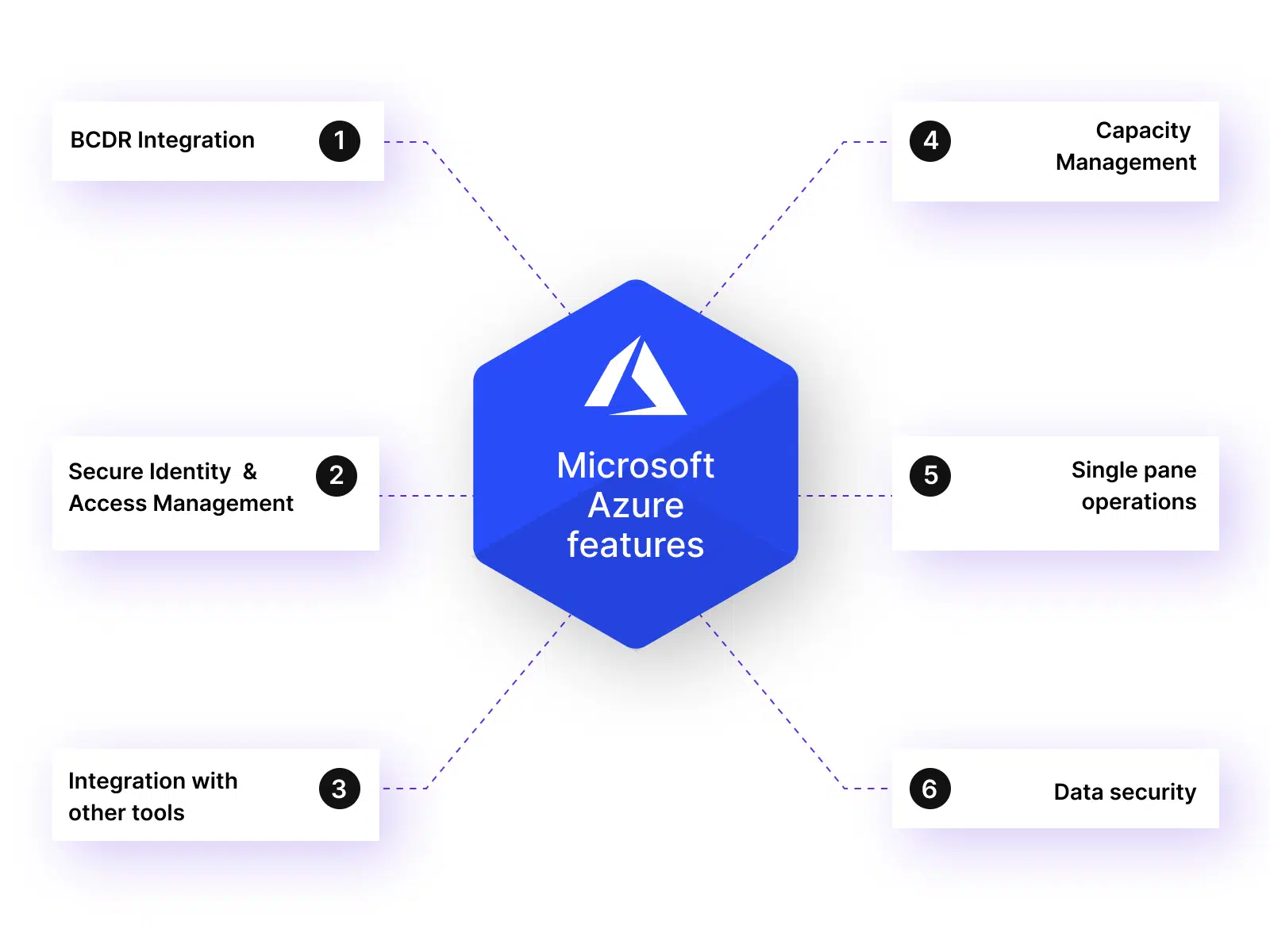Azure Benefits: Introduction
When it comes to cloud computing, businesses must carefully evaluate the top Azure benefits for their enterprises. While cloud computing has changed how companies work and helped them to scale and expand considerably. 81% of all enterprises have a multi-cloud strategy already laid out or in the works.
Cloud computing offers databases, servers, software, analytics, and intelligence over the Internet or the cloud. Nowadays, practically any service that does not require hardware support can be delivered through this architecture. Additionally, it comes in mainly three types: Infrastructure As An Service (IaaS), Platform As A service (PaaS), and Software As A Service ( SaaS).
Cloud computing uses a Pay-as-you-use model, allowing enterprises to only spend on the services they want to use, thus significantly cutting down on their spending. This will enable them to efficiently maximize their resources’ utility and focus on other business aspects without worrying about technical maintenance and working. In addition, cloud data centers are set up worldwide in certain designated regions. This helps organizations to take up resources from a third party and use them at their convenience.
It’s no wonder that tech giants such as Google, Amazon, and Microsoft have developed their cloud platforms to aid businesses and offer their services and technical expertise in a much more efficient and cost-effective manner. Cloud infrastructure services generate almost 178 billion dollars annually and account for nearly 3% of the world’s energy consumption!
Microsoft Azure is a cloud-computing service offered by Microsoft and was released back in 2008. Several Azure benefits make it a popular choice for businesses; thus, its knowledge and awareness are essential.
Azure Benefits For Your Business: Is It Worth It?
Companies like Verizon understand the azure benefits well, as they spend more than $79.9 million on Azure annually. This is because Microsoft Azure allows you to build, deploy and manage apps more quickly, so the business saves costs and fulfills its goals.
Moreover, IHG, a British hospitality multinational company, uses Azure for DevOps and to strengthen their security. It uses its hybrid cloud and is not entirely cloud-based, and this model has helped them to cut costs by up to 70%. IHG also has better data management and backup practices and less pressure in administration and technical functioning.
Some significant benefits are:
1. Scalability
This is one of the main benefits that businesses are adopting Microsoft Azure. Moreover, businesses can increase or decrease their number of resources based on the load and traffic. These services scale out to ensure capacity during workload peaks and return to normal automatically when the peak drops. Businesses can thus deal with resources as per their need, lowering their management and expenses strain as too few or too many technical services are not a good option for the efficiency of the business.
2. Security & Disaster Recovery
For businesses, it’s crucial to avoid downtime and protect the server’s data. Azure prioritizes this need and offers many services and certifications to prevent inconvenience. Sectors like health, government, and finance thus choose Microsoft as their cloud provider due to its highly resistant system, which helps to recover any loss in data in case of a major failure, as well as keep the client’s security and integrity in mind.
3. Hybrid Deployment
A hybrid cloud integrates public and private cloud features, making it an excellent option for businesses as they can customize the cloud model per their own needs. You can thus take benefit of the on-premise resources and the cloud and avoid cases such as storing all their data on the public cloud. Using a purely public or private cloud can be risky regarding business criticality and flexibility. However, Azure helps you overcome this shortcoming and achieve the maximum business output using high-performance resources.
4. Expands Your Current IT Infrastructure
Azure has over 200 products and services that help you expand your IT infrastructure and increase your potential. Furthermore, you can rent these as per your needs and choose from various options. It allows you to automate the deployment and management life cycle completely and provides support for building reliable and highly functional applications.
5. Saves Money
One of the biggest reasons businesses adopt Microsoft Azure is to reduce capital infrastructure investment highly. Indeed, buying and maintaining databases, servers, and network solutions for millions of customers can prove to be quite heavy and complicated. Businesses do not usually have that many human and monetary resources to take up this task independently. Azure allows you to rent services according to your varying needs and pay accordingly without extra cost.
Microsoft Azure features that make it great for an enterprise.
Microsoft Azure Features
These features can also be seen as benefits of Microsoft Azure that can transform the scope of your application completely:
1. BCDR Integration: Ensuring Azure Benefits
For backup and Disaster Recovery, Azure integrates Business Continuity/ Disaster Recovery (BCDR) strategies to ensure the smooth workflow of the application. Moreover, it has services like Azure backup, which makes backup copies of all the files and data stored on your cloud. All this backed-up data is stored in the Azure Recovery Services Vault, from where it is recovered. Azure Site Recovery (ASR) comes into play in case of a significant failure in the application and restores the entire data center to working conditions.
2. Secure Identity & Access Management: Enhancing Azure Benefits
To prevent attacks from hackers and ensure foolproof authentication, Microsoft Azure has an Azure Active Directory with Identity and Access Management capabilities. Enterprises can use features like multi-factor authentication and organizational credentials for restricted access. Additionally, this helps to protect your resources and all the sensitive data you have trusted your cloud provider with. This is one of the key benefits of Microsoft Azure.
3. Integration With Other Tools: Leveraging Azure Benefits
Microsoft has multiple other services like Office 365, which have various functionalities and great use. Azure is thus a popular choice, as it integrates seamlessly with other Microsoft tools and on-premise products.
4. Capacity Management: Scalable Azure Benefits
Capacity management is highly variable and time confusing, depending on data growth. However, StorSimple is an Azure benefit with built-in features that address all the storage requirements of enterprise business, including data tiering, archiving, compression, and off-site storage. Terabytes of cloud storage are available through this method, which the enterprise can use to scale up. This acts as one of the prime advantages of Azure for businesses.
5. Single Pane Operations: Simplifying Azure Benefits
Mircosoft Operating Management System (OMS) is a Management-as-a-Service (MaaS) that provides a single-pane view, which shows all the services you are using, your subscription model, and the various analytics, such as data, storage, and intelligence. It helps the enterprise to keep track of and manage all the resources, be it on-premises or on the cloud, to gain valuable insights and prevent any attacks by external resources.
6. Data Security: Strengthening Azure Benefits
There are various services provided by Azure that help to protect the organizations’ data. Specifically, the Azure Key Vault allows the client to store their customized keys used for encryption. All the Azure stored data is encrypted by default through various mechanisms. VMs can also be encrypted, as well as discs which helps to maximize security as much as possible.
Some Challenges That Come With Azure
1. Confusing Setup & Management
Human resources are required at the cloud data centers to ensure smooth functioning and monitor the parameters. Also, when migrating to the cloud, there comes a stage where some resources are on the cloud and others are managed on-premise, creating an overlap and operational confusion.
2. Requires Platform Expertise for Azure Benefits
Navigating Azure can be challenging and inefficient if the business administrators are unaware of its functioning and integrating features. This can cost the business a massive loss of money and time and disrupt the application’s working entirely. Therefore, in-depth knowledge is needed for operational efficiency, as figuring out the mistake becomes a big challenge.
3. Does Not Always Have All The Services For The Requisite Solution
It’s not necessary that Azure might provide you with all the services needed for your business solution. For instance, a fantastic example is Reporting Services. There is no SaaS in Azure for Reporting Services, and there aren’t many benefits for considering IaaS for this. Sometimes, compromise in technology might be needed for fulfilling a particular functionality.
Markovate & Its Expertise With Azure
Azure benefits, if exploited properly, can take the business to great heights.
Markovate understands this need and the growth it can provide to your business. Therefore, we aim for agile and reliable solutions that can scale to meet the needs of millions of customers and boost productivity. We integrate AI, ML, IoT, and the latest cutting-edge technologies to help build fully functional systems.
Our end-to-end Azure development services by certified Azure engineers ensure that your enterprise gets an engaging and user-friendly application that fulfills your business targets. Moreover, from evaluation to understanding the company’s objectives and developing a robust product using various Azure services, we continuously test the product designed to give you the best possible experience!
Further Read: AWS vs Azure: What You Should Choose For Enterprise App Development?
Microsoft Azure: FAQs
1. What three essential services does Azure offer?
Azure DevOps, Azure Virtual Machines, and Azure Cosmos DB are some essential services Azure offers, among many others.
2. How is Azure better than other cloud services?
Azure is suitable for hybrid cloud models, is cheaper, offers excellent PaaS services, and has an integrated environment.
3. Why do people choose Azure over AWS?
AWS complicates matters, demands extensive documentation, and offers a weaker hybrid cloud model compared to Azure.









